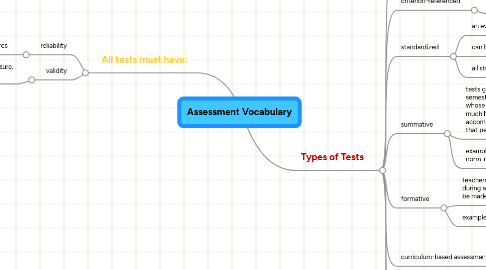
1. Types of Tests
1.1. norm-referenced
1.1.1. students are compared to the performance of the other students
1.1.2. examples: can be summative if they are given at the end of a period.
1.2. criterion-referenced
1.2.1. student performance is compared to specific criteria
1.3. standardized
1.3.1. an evaluation comparing to a standard
1.3.2. can be norm-referenced or criterion referenced
1.3.3. all students take the test under the same conditions
1.4. summative
1.4.1. tests given at the end of a semester, quarter, or unit whose results show how much has been accomplished throughout that period of time.
1.4.2. examples: achievement tests, norm-referenced tests
1.5. formative
1.5.1. teachers use to evaluate student progress during a lesson, unit, etc so that changes can be made to accommodate the student..
1.5.2. examples: weekly tests
1.6. curriculum-based assessment
1.6.1. any procedure that evaluates student performance in relation to the school curriculum
1.6.2. examples: spelling tests
1.7. curriculum-based measurement
1.7.1. frequent, direct measurements of critical school behaviors. allows teachers to modify the instruction.
1.7.2. examples: timed reading tests, math tests, and writing tests, formative tests
1.8. performance assessments
1.8.1. curriculum based, students construct responses to real-world tasks allowing the teacher to evaluate their understanding.
1.9. portfolio assessments
1.9.1. curriculum-based consisting of student-made products showing their skills
2. All tests must have:
2.1. reliability
2.1.1. determines that the test is consistent in what it measures
2.2. validity
2.2.1. extent to which a particular test measures what it is intended to measure. evaluated by comparing different tests of the same skills or abilities
